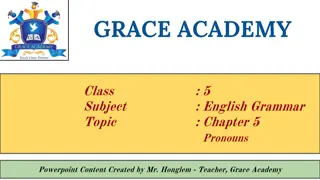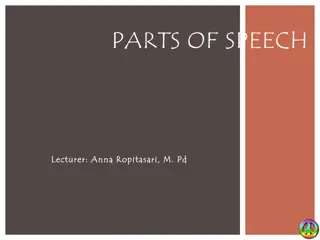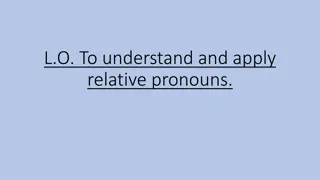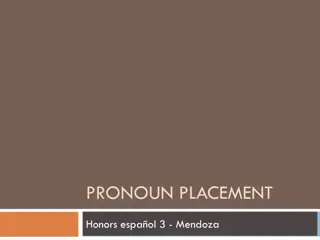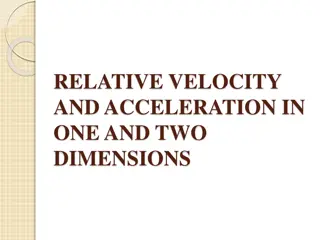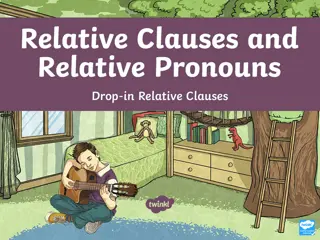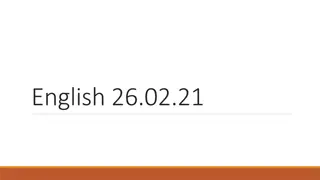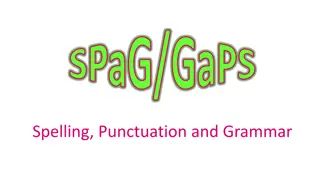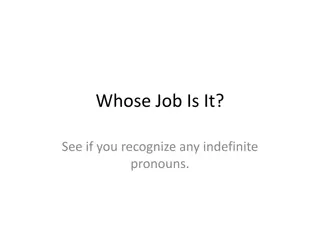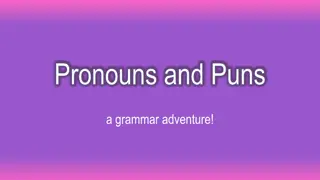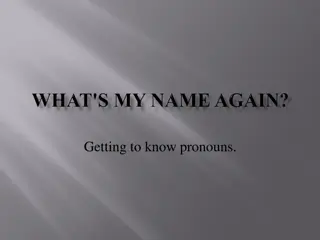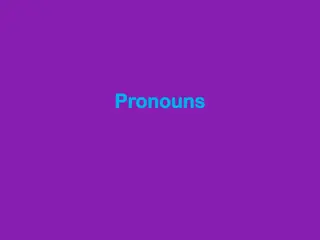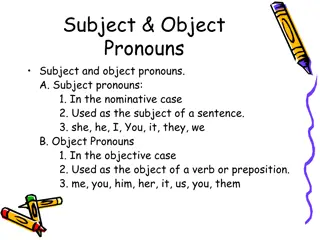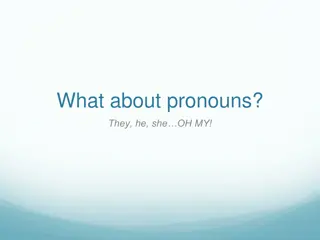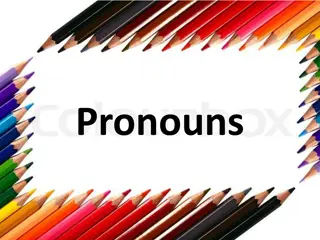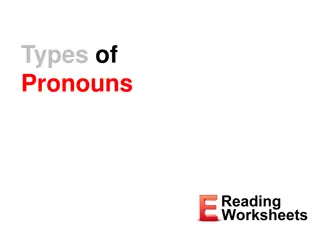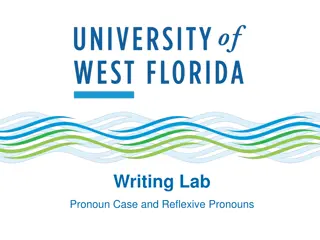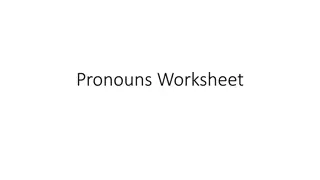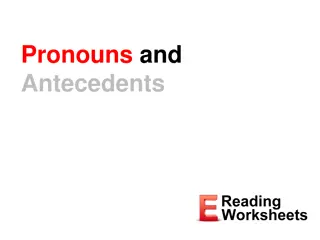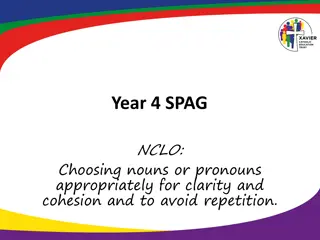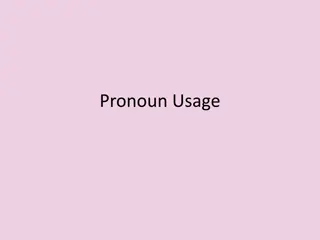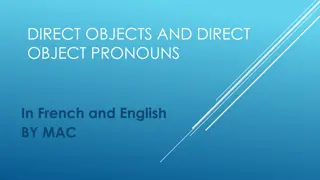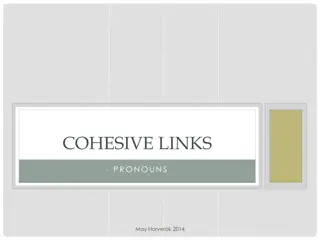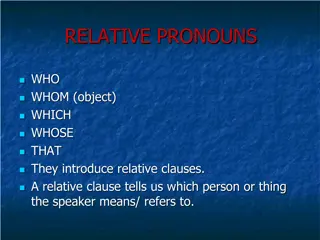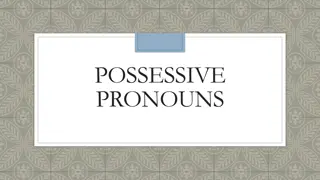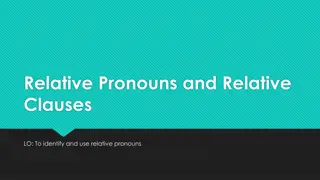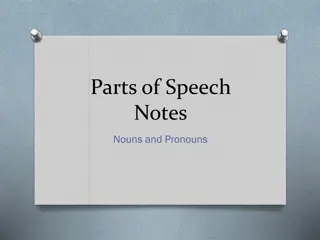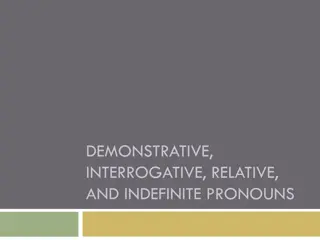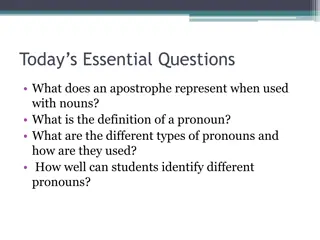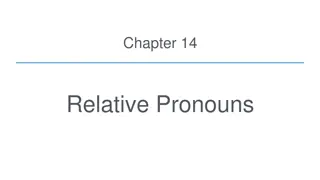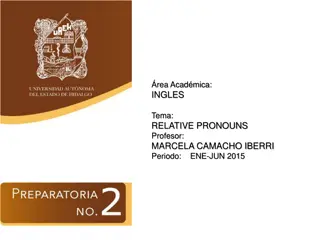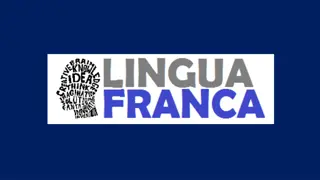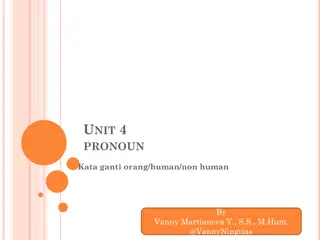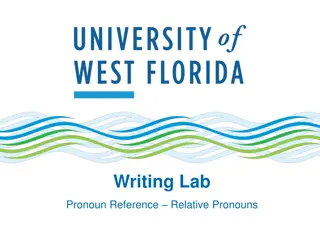Learn to Use Relative Pronouns in Sentences
Explore lessons on identifying and using relative pronouns like "who" and "which" to connect ideas. Practice constructing sentences with these pronouns to refer to people, animals, and objects effectively. Enhance your grammar skills with engaging exercises provided by the Ministry of Education.
1 views • 11 slides
Pronouns: A Comprehensive Guide for English Learners
Explore the world of pronouns with this detailed presentation created by Mr. Honglem from Grace Academy. Learn what pronouns are, discover their types including personal and possessive pronouns, and understand how to use them correctly in sentences. Engage in interactive practice exercises to enhanc
1 views • 22 slides
Parts of Speech: Nouns and Pronouns Overview
Dive into the world of nouns and pronouns with this detailed guide covering definitions, examples, and practice exercises on common nouns, proper nouns, and different types of pronouns such as personal, demonstrative, and interrogative pronouns.
1 views • 19 slides
Relative Pronouns in English Grammar
In this lesson, we delve into the concept of relative pronouns in English grammar. Relative pronouns like who, whom, which, and that are used to connect clauses or phrases to nouns or pronouns. Through examples and exercises, learners can practice identifying and using relative pronouns effectively
6 views • 8 slides
Pronoun Placement Rules in Spanish Sentences
Clear up confusion around the placement of reflexive, direct object, and indirect object pronouns in Spanish sentences and commands. Learn the placement rules for different types of pronouns in statements and commands, including examples for single-verb and two-verb sentences. Understand the order o
2 views • 10 slides
Relative Velocity and Acceleration in Physics
Relative velocity is defined as the velocity of an object in the rest frame of another object, and it can be negative depending on the difference in velocities. The need for using relative velocity lies in determining if an object is at rest or moving. The formula for relative velocity involves the
1 views • 25 slides
Relative Clauses and Pronouns
Utilize relative clauses to provide additional information to a noun, using relative pronouns such as who, which, where, when, and whose. Learn how to construct complex sentences with at least two clauses, ensuring the subordinate clause complements the main clause. Explore examples and practical st
2 views • 14 slides
Mastering Pronouns in English Writing
Learn about pronouns and how they are used to avoid repetition in writing. Understand the definition of pronouns, examples of common pronouns, and how to identify and use them effectively within a piece of writing. Practice matching underlined nouns or noun phrases with the correct pronouns to enhan
1 views • 19 slides
English Language Basics - SPaG/GaPS, Determiners, Adjectives, Nouns, Pronouns, Relative Pronouns, Punctuation
Enhance your understanding of English language basics with concepts such as SPaG/GaPS, determiners, adjectives, nouns, pronouns, relative pronouns, and punctuation. Dive into the world of grammar essentials for Key Stage One and Two learners, covering topics like parts of speech, sentence structure,
0 views • 61 slides
Indefinite Pronouns: A Tale of Everybody, Somebody, Anybody, and Nobody
This story highlights the importance of recognizing indefinite pronouns such as everybody, somebody, anybody, and nobody. Through the tale of four individuals and a task left undone, the narrative emphasizes the roles of common, singular, and plural indefinite pronouns in subject-verb agreement. Exp
0 views • 11 slides
Partitive Pronouns in Italian and Dutch: A Comparative Analysis
This study explores the use of partitive pronouns in intransitive contexts in Italian and Dutch, examining their roles in both languages. The research delves into the nuances of partitive pronouns, their syntactic structures, and their interactions with direct objects and quantified adverbial phrase
0 views • 31 slides
Fun with Pronouns and Puns in Grammar
Explore the world of pronouns with humor while learning about personal pronouns and reflexive pronouns. Test your knowledge with interactive exercises and witty examples. Get ready for a grammar adventure filled with wordplay!
0 views • 12 slides
Pronouns: Types and Examples
Learn about different types of pronouns, including personal pronouns, and how they work by replacing nouns in sentences. Discover the concept of antecedents and how they relate to pronouns through examples. Explore singular and plural forms of personal pronouns with gender distinctions.
0 views • 12 slides
All About Pronouns: Definition, Types, and Practice
Pronouns are words that replace nouns to avoid repetition in writing. They come in different types, such as subject pronouns, which are the subjects of verbs, and object pronouns. This content covers the basics of pronouns, provides examples, identifies subject pronouns, and offers practice exercise
0 views • 16 slides
Subject and Object Pronouns
Learn about subject and object pronouns, their usage in sentences, and examples to differentiate between them. Subject pronouns are used as the subject of a sentence, while object pronouns function as the object of a verb or preposition. Understand when to use pronouns like "I" or "me," "they" or "t
0 views • 13 slides
Pronouns and Their Importance in Communication
Pronouns are essential in language, serving to replace nouns and avoid repetition. They include third-person singular forms like "he," "she," and "they." By using pronouns correctly and respecting others' pronouns, we show understanding and promote inclusivity in communication.
0 views • 7 slides
Learn Pronouns with Fun Activities and Exercises!
Explore the concept of pronouns through engaging activities like games, songs, and quizzes. Discover how to recognize and use pronouns effectively by rewriting sentences with possessive pronouns. Practice your skills with online resources and have fun while learning about pronouns!
0 views • 6 slides
Different Types of Pronouns
Learn about the seven types of pronouns - Personal, Possessive, Reflexive, Relative, Demonstrative, Indefinite, Interrogative. Personal pronouns replace nouns, possessive pronouns replace possessive nouns, reflexive pronouns refer back to the subject, relative pronouns introduce relative clauses, an
0 views • 16 slides
Mastering Reflexive Pronouns in Writing
Understand the importance of reflexive pronouns in writing, including examples of correct and incorrect usage. Learn why reflexive pronouns should not replace personal pronouns and how to use them effectively for clarity and precision in your writing. Enhance your writing skills by mastering the use
0 views • 6 slides
Pronouns: Complete Worksheet for Practice
This detailed worksheet provides comprehensive information on subject pronouns, object pronouns, possessive adjectives, possessive pronouns, and reflexive pronouns. It includes examples and exercises to help you understand and practice using pronouns correctly in sentences.
0 views • 15 slides
Pronouns and Antecedents in Grammar
Explore the importance of pronouns and antecedents in sentences, including how pronouns replace nouns for smoother language flow. Learn to avoid vague pronouns by ensuring clear antecedents. Examples illustrate how pronouns such as "he," "they," and "it" refer back to specific nouns like "General Kr
0 views • 10 slides
Nouns, Pronouns, and Cohesion in Writing
Learn the importance of choosing nouns and pronouns appropriately for clarity, cohesion, and to avoid repetition in writing. Understand how pronouns can help maintain cohesion in a text by referring back to nouns effectively. Practice using pronouns to complete sentences and improve your writing ski
0 views • 12 slides
Pronoun Case: Nominative and Objective Pronouns
We have covered all pronouns in the slide show but still need to discuss pronoun case. Personal pronouns have nominative and objective cases. Nominative pronouns like "I" are used as subjects, while objective pronouns like "me" are used as objects. Learn how to use them correctly in sentences with e
0 views • 11 slides
Direct Objects and Direct Object Pronouns in English and French
Explore the concepts of direct objects and direct object pronouns in English and French languages. Learn how direct objects are used in sentences, the role of direct object pronouns in avoiding repetition, and the differences in sentence structure when using object pronouns in French. Discover commo
1 views • 24 slides
Pronouns in English Grammar
Explore the role of pronouns in English grammar through examples and explanations of different types like demonstrative, relative, and personal pronouns. Learn how pronouns replace nouns and refer to concepts within sentences, enhancing clarity and flow in communication.
0 views • 6 slides
Relative Pronouns in English
Relative pronouns such as who, whom, which, whose, and that are used to introduce relative clauses in English grammar, specifying which person or thing is being referred to. They play a crucial role in defining and non-defining relative clauses, providing essential information and connecting sentenc
0 views • 16 slides
Possessive Pronouns and Their Usage
Possessive pronouns indicate ownership and possession, such as mine, yours, hers, and theirs. Learn more about possessive pronouns with examples and practice exercises to enhance your understanding. Discover how to identify possessive pronouns in sentences and improve your grammar skills.
0 views • 5 slides
Relative Pronouns and Determiners in Grammar
Learn about the difference between pronouns and determiners, specifically possessive pronouns and determiners, and practice identifying them in sentences. Discover the concept of relative pronouns and how they are used in English grammar.
0 views • 18 slides
Nouns and Pronouns in Grammar
Dive into the world of nouns and pronouns with this comprehensive guide. Learn about different types of nouns such as concrete, abstract, collective, and compound nouns. Explore the distinction between common and proper nouns. Discover the role of pronouns as words that substitute for nouns, includi
0 views • 7 slides
Demonstrative, Interrogative, Relative, and Indefinite Pronouns
Demonstrative pronouns point out specific people, places, things, or ideas. They include "this," "that," "these," and "those." Interrogative pronouns introduce questions and include "what," "which," "who," "whom," and "whose." Understanding the usage of these pronouns is essential in forming clear a
0 views • 21 slides
Pronouns: Types and Usage in English Grammar
Delve into the world of pronouns with this comprehensive guide covering definitions, types, and examples of personal, demonstrative, interrogative, relative, indefinite, distributive, reflexive, emphatic, and reciprocal pronouns. Explore how pronouns function as essential parts of speech in English
0 views • 6 slides
Apostrophes and Pronouns in Grammar
Apostrophes are used to show ownership with nouns, while pronouns replace nouns in sentences. Learn the rules for apostrophe usage and different forms of pronouns including subject, object, and possessive pronouns. Practice identifying and using pronouns effectively in various sentence structures.
0 views • 15 slides
Mastering Relative Clauses in Writing
Enhance your writing skills by mastering the use of relative clauses to draw inferences about characters' feelings, thoughts, and motives. Learn how to add extra information to sentences using relative clauses beginning with who, which, where, when, whose, that, or an omitted relative pronoun. Explo
0 views • 20 slides
Learning Relative Pronouns with Visual Aids
Explore the concept of relative pronouns through a series of helpful images and practice exercises. Enhance your understanding of using relative pronouns in sentences, from basic to more complex structures. Develop your skills with warm-up activities and translation exercises for practical applicati
1 views • 34 slides
Relative Pronouns "Who" and "Which" - Grade 6 English Lesson
Learn about relative pronouns "who" and "which" in this Grade 6 English lesson. The lesson aims to help students identify and use these pronouns correctly in sentences referring to people, things, or animals. Practice exercises and assessment tasks are included to reinforce understanding.
0 views • 7 slides
Relative Pronouns: Key Concepts and Examples
Explore the use of relative pronouns such as "who," "which," and "that" to introduce clauses that provide additional information. Learn how these pronouns relate to the words they modify, with a focus on comprehension and identification in texts describing people, objects, and places. Discover the r
0 views • 16 slides
Pronouns: Types and Usage
Pronouns are vital elements in language that replace nouns to avoid repetition and make sentences concise. They include personal, possessive, reflexive, intensive, indefinite, demonstrative, relative, interrogative, and reciprocal pronouns. Personal pronouns serve as subjects (e.g., I, he, she) or o
0 views • 18 slides
Pronouns and Possessives in English Grammar
Explore the various types of pronouns and possessives in English grammar, including personal pronouns, possessive adjectives, possessive pronouns, reflexive pronouns, and relative pronouns. Learn how to use them correctly in sentences and understand their roles in different contexts.
0 views • 20 slides
Mastering Relative Pronouns: A Comprehensive Guide
Dive into the world of relative pronouns with this comprehensive guide featuring explanations and examples of using who, whoever, whom, whomever, whose, which, that, and this. Explore how to choose the right relative pronoun for people, places, and things, and learn about their usage in restrictive
0 views • 5 slides
Relative Pronouns and Adjective Clauses in Literature
Explore the use of relative pronouns and adjective clauses in literary works by authors like Gary D. Schmidt and Jim Murphy. Learn the distinctions between "who," "whose," "whom," and "that" in referring to people and things. Practice identifying and creating examples of adjective clauses starting w
0 views • 10 slides

